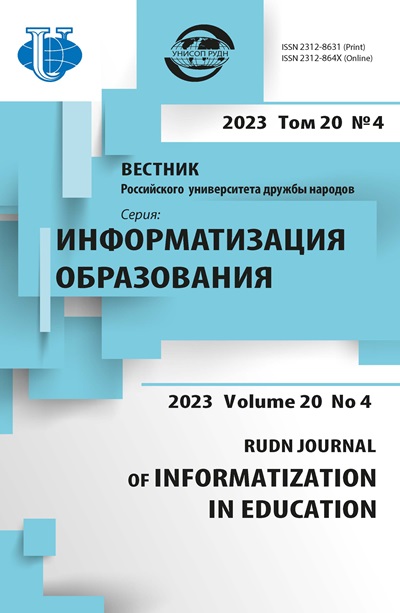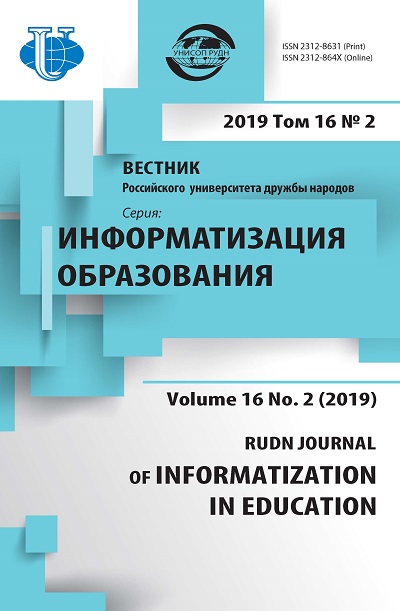Design of automation system for building personal education trajectories of students
- Authors: Zaslavsky A.A.1
-
Affiliations:
- Moscow City University
- Issue: Vol 16, No 2 (2019)
- Pages: 149-161
- Section: INNOVATION PEDAGOGICAL TECHNOLOGIES IN EDUCATION
- URL: https://journals.rudn.ru/informatization-education/article/view/21647
- DOI: https://doi.org/10.22363/2312-8631-2019-16-2-149-161
Cite item
Full Text
Abstract
Problem and goal. Programs “Digital economy of the Russian Federation” and “Digitalization of education” prescribe the development of tools for the formation of an individual approach to each student. Currently, the tools of the organization of individual approach in the form of building an individual learning path are not perfect. Consider the modern aspects of the construction of personal trajectories of development of students, the selection of personal forms of control and reflection, personal goals and content of training. As the main tool for the organization of this approach, we propose to use a specially created system of automation of building personal trajectories of development of students. Methodology. To achieve the objectives the article describes the algorithm design of the system automating the selection of individual learning paths in basic stages. Methodical bases of differentiation and individualization of training, lists of documents obligatory for system start, and also basic principles of design of system are presented. Special attention is paid to the means of ensuring external and internal information security. Results. When following the stages of design, presented in the article, the system of automation of personal trajectories will have a basic set of necessary functions that will respond to the challenges formulated in the “Digitalization of education”. This system will simplify the work of teachers in terms of reducing the cost of building an individual trajectory. Conclusion. The application of the designed system will allow teachers to quickly and efficiently build individual educational trajectories for all their students, based on their individual capabilities and personal characteristics; for students and parents to access the constructed trajectory at a convenient time, perform tasks and monitor the learning process; for administration to see the learning process of each individual student and build analytical reports on the learning process.
About the authors
Alexey A. Zaslavsky
Moscow City University
Author for correspondence.
Email: zaslavskijjaa@mgpu.ru
candidate of pedagogical sciences, associate professor, associate professor of the directorate of educational programs of the Moscow City University
29 Sheremetyevskaya St., Moscow, 127521, Russian FederationReferences
- Portal “Ekonomika” [Portal “Economy”]. https://data-economy.ru/education (accessed: 19.02.2019).
- Federal’nyj zakon “Ob obrazovanii v Rossijskoj Federacii” ot 29.12.2012 № 273-FZ (polnyj tekst dokumenta) [Federal law “On education in the Russian Federation” of 29.12.2012 No. 273-FZ (full document)]. http://www.zakonrf.info/zakon-ob-obrazovanii/ (accessed: 21.02.2019).
- Glavnyj trend rossijskogo obrazovaniya — cifrovizaciya [The main trend of Russian education is digitalization]. Uchitel’skaya gazeta [Uchitelskaya Gazeta]. 23 yanvarya 2018 goda. No. 4. http:// www.ug.ru/article/1029 (accessed: 19.03.2019).
- Vergun T.V., Kolosova O.Yu., Goncharov V.N. Individual’nye obrazovatel’nye traektorii studentov v vysshej shkole: k postanovke problemy [Individual educational trajectories of students in higher education: to the problem statement]. Sovremennye naukoemkie tekhnologii [Modern scienceintensive technologies]. 2016. No. 12—2. Pp. 313—317.
- Galeeva N.L., Zaslavskij A.A. 100 i 5 priemov dlya uspekha uchebnoj deyatel’nosti na urokah informatiki [100 and 5 techniques for the success of educational activities in the classroom of computer science]. Moscow: Kniga po trebovaniyu Publ., 2013. P. 117.
- Zaslavskaya O.Yu. Sovershenstvovanie professional’noj i upravlencheskoj kompetentnosti prepodavatelya v svyazi s vnedreniem informacionnyh tekhnologij [Improvement of professional and managerial competence of the teacher in connection with the introduction of information technologies]. Nauka i shkola [Nauka i shkola]. 2006. No. 3. Pp. 52—54.
- Zaslavskij A.A. Didakticheskie vozmozhnosti oblachnyh prilozhenij [Didactic possibilities of cloud applications]. Mezhdunarodna nauchna shkola “Paradigma”. Lyato–2015: v 8 t. T. 5. Pedagogika: sbornik nauchni trudov [International scientific School “Paradigma”. Summer—2015: in 8 vols. Vol. 5. Pedagogy: collection of scientific articles]. Varna: CNII “Paradigma”, 2015. Pp. 100— 108.
- Lipatnikova I.G., Polyanina A.S. Formirovanie celevogo komponenta uchebnoj deyatel’nosti studentov s ispol’zovaniem priemov prinyatiya resheniya v ramkah refleksivnogo podhoda [Formation of the target component of educational activity of students with the use of decisionmaking techniques within the reflexive approach]. Problemy i metodika prepodavaniya estestvennonauchnyh i matematicheskih discipline: materialy III Vserossijskoj nauchno-prakticheskoj konferencii [Problems and methods of teaching natural science and mathematical disciplines: materials of the III All-Russian scientific-practical conference]. Еkaterinburg: Ural’skii institut ekonomiki, upravleniya i prava Publ., 2007. Pp. 194—197.
- Razygraeva V.A., Lyamin A.V. Algoritmicheskoe obespechenie formirovaniya individual’noj traektorii obucheniya s uchetom funkcional’nogo sostoyaniya studenta [Algorithmic support for the formation of an individual learning path taking into account the functional state of the student]. Informacionnaya sreda vuza XXI veka: materialy V Mezhdunarodnoj nauchno-prakticheskoj konferencii [Information environment of the University of the XXI century: materials of V International scientific-practical conference]. Petrozavodsk: PetrGU Publ., 2011. Pp. 158—161.
- Sazhina N.M. Informacionno-obrazovatel’nye tekhnologii v koncepcii lichnostnorazvivayushchego obucheniya [Information and educational technologies in the concept of personal development training]. Vestnik Adygejskogo gosudarstvennogo universiteta. Seriya: Pedagogika i psihologiya [Bulletin of the Adyghe State University. Series Pedagogy and psychology]. 2009. Vol. 3. Pp. 99—109.
- Timoshina T.A. Koncepciya vystraivaniya individual’noj obrazovatel’noj traektorii studenta [The concept of building an individual educational trajectory of the student]. Pedagogika i psihologiya kak resurs razvitiya sovremennogo obshchestva: sbornik statej 2-j Mezhdunarodnoj nauchnoprakticheskoj konferencii (Ryazan’, 7—9 oktyabrya 2010 g.) [Pedagogy and psychology as a resource for the development of modern society: collection of articles of 2nd International scientific-practical conference (Ryazan, 7—9 october, 2010)]. Ryazan’, 2010. Pp. 315—320.
- Hutorskoj A.V. Metodika lichnostno-orientirovannogo obucheniya. Kak obuchat’ vsekh po-raznomu?: posobie dlya uchitelya [Methods of personality-oriented learning. How to teach everyone differently?: manual for teachers]. Moscow: VLADOS-PRЕSS Publ., 2005. 383 p.
- Yurkov N.K. Intellektual’nye komp’yuternye obuchayushchie sistemy: monografiya [Intelligent computer training systems: monography]. Penza: PGU Publ., 2010. 304 p.
- Zaslavskaya O.Yu., Zaslavskiy A.A., Bolnokin V.E., Kravets O.Ja. Features of Ensuring Information Security when Using Cloud Technologies in Educational Institutions. International Journal on Information Technologies and Security. 2018. Vol. 10. No. 3. Pp. 93—102.
- Zaslavskaya O.Yu. Components of teacher’s management competency: knowledge and skills, activity, functional areas. American Journal of Pedagogy and Education. 2013. No. 1. Pp. 13—15
















